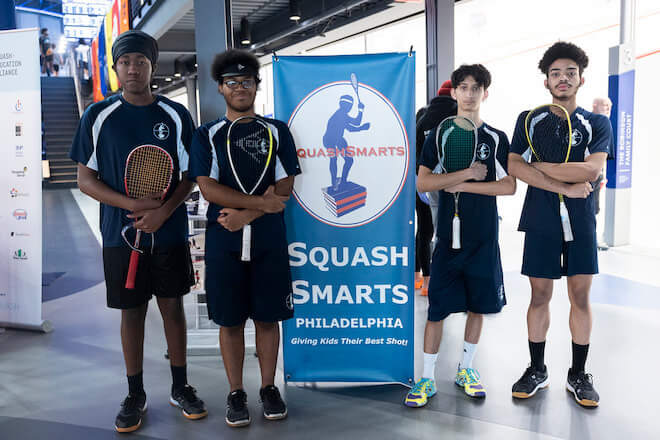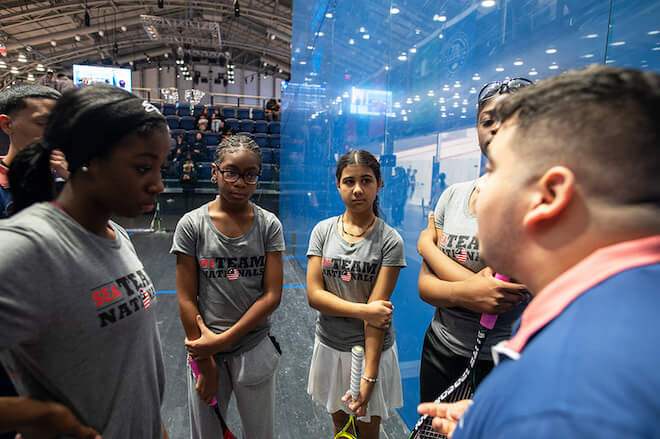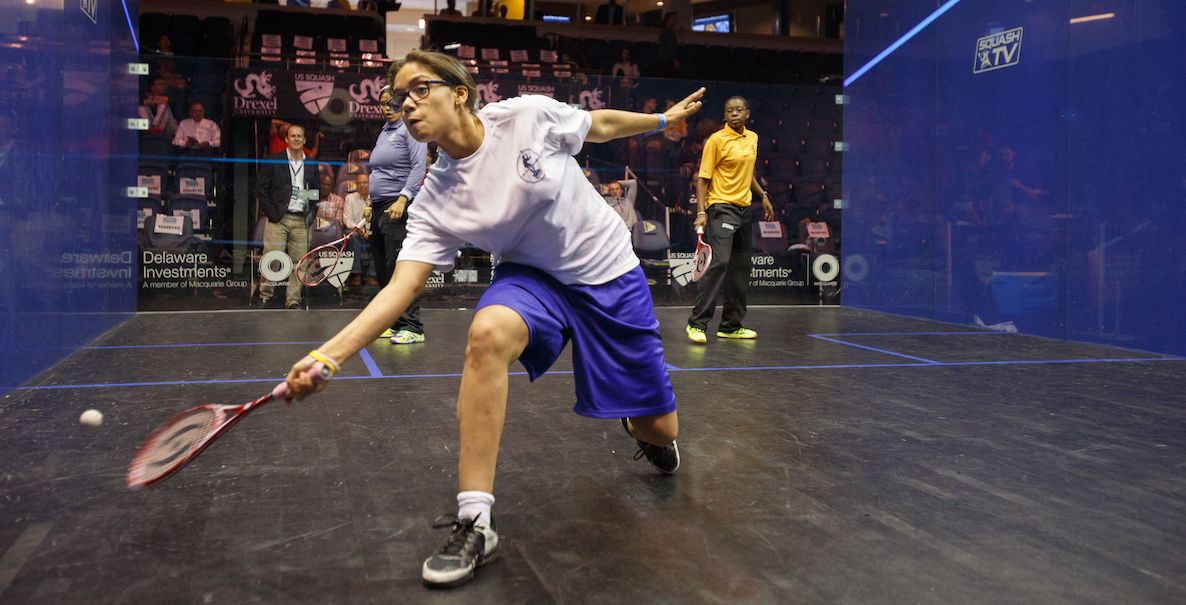Late afternoon sunshine streams through the oversized windows on the second floor of the Lenfest Center on North 10th Street, rising like a glistening sail among a sea of rowhomes in Hunting Park.
The start-of-spring vibes are matched by the exuberance of students enjoying a typical weekday at the North Philly headquarters of SquashSmarts, the nonprofit youth sports and academic program that recruits kids from five middle schools in North and West Philly and serves them through high school and beyond, providing them with a uniquely holistic after-school program.
Students — there are currently 160, split between this and a West Philly site — arrive from school via free transportation (shuttles for middle schoolers, SEPTA for older kids). They receive free meals, then change into SquashSmarts-provided sneakers and grab a SquashSmarts-provided racquet.
Half of the group starts its one hour of squash on any of the facilities’ eight courts. The other half heads to cheery classrooms — walls lined with college pennants, ceilings bedecked in international flags — for academic instruction, homework help and tutoring during the school year, and activities aimed at avoiding the “summer slide” during the summer. At the hour mark, the groups switch places.
On weekends, students from both sites compete in tournaments locally and around the country. During the summer, they fan out to SquashSmarts’ partners like Outward Bound, The Hotchkiss School summer program, Rochester’s STEM camp, Penn, Drexel, Penn Charter. A select few will head overseas, to squash programs in England and, for the first time this year, Israel.
In Squash: A History of the Game, written by Philly native James Zug (who starred on the squash teams at Haverford and Dartmouth), Zug closes his 282-page tome with a nod to SquashSmarts and programs like it:
Working-class African-American and Hispanic children provide the most exciting developments in … American … squash. […] These youth programs are a symbol of the future of the game.

Why not Philly?
SquashSmarts was incorporated in 2000 and opened its courts — originally housed at Drexel University — in 2001, making it the third urban squash-and-education program in the country, and the first one started not by any one individual, but through a collaboration of parents who saw what was happening at SquashBusters in Boston and StreetSquash in New York and said: Why not Philly?
Why not Philly? It’s a question that’s not asked enough — by our elected officials, our leaders, our citizens. But SquashSmarts is proof of an increasingly successful formula that Philadelphians should be bold enough to embrace more often: Take collaborators from various sectors, add in dedicated leadership, be flexible, lead with love, and you will have a win — metaphorically and, often, literally. Just last month, SquashSmarts’ middle school girls’ team took home the first place trophy at the 2023 Squash and Education Alliance Team Nationals, held right here in Philadelphia.
Today, the organization is led by executive director Stephen Gregg, who came on board in 2004. A former Division 1 squash player under Trinity’s recently retired Paul Assaiante, one of the winningest coaches in college sports history, Gregg is gregarious and self-effacing, and also decidedly clear-eyed. He does not claim that SquashSmarts is solving gun violence, or that it provides the answer to all of our city’s problems, or that it’s reaching any more children than it actually does.
“The urban squash world is a completely different being. It’s a subculture within the squash culture,” says Bowden. “And we love it.”
“I have a pretty good sense of when we’ve had a positive impact on a young person’s life. And I think we can then draw a dotted line to how we’ve improved that child’s family or household. But it becomes a very blurred line to say if or how we have changed the block or the neighborhood or the city,” he says.
He believes the youth nonprofit sector needs greater oversight — he’d like to see donors getting out and checking for themselves where their dollars are spent, showing up at programs that claim to serve X number of kids, and verifying for themselves if that’s really the case. At a time when corruption among anti-violence initiatives seems rampant, that advice seems particularly wise.
Then again, Gregg’s call to action may stem from the fact that his team has data to back up their success. Overall, 77 percent of SquashSmarts’ alumni have gone on to college, with the remaining 23 percent going on to careers. The program has 300-plus alumni, and 120 of them are still engaged and active with the program. Its most recent graduating class of 15 included five students who earned full college scholarships, and another two who were named QuestBridge Scholars to attend the University of Pennsylvania and Tufts University, also on full rides.
What’s more, according to a Temple University Sports Industry Research Center study conducted during Mayor Kenney’s Task Force on Youth Sports, SquashSmarts’ middle school students attend an average of 89 instructional sessions per year. High school students attend an average of 93 sessions per year — making SquashSmarts 4 to 5 times more intensive than many of its peer youth mentoring programs.
Gregg says it’s an “inch-wide/mile-deep type of program.” It’s not going after every kid in the city: It’s focusing, deeply, on the ones in the neighborhood.

The long game
Much of SquashSmarts’s success comes down to its longitudinal approach. They begin recruitment in fourth grade, visiting gym classes at five neighborhood schools. They’re not looking for the best athletes or the best students, the kids who always get picked for awards and programs and, most likely, will be just fine. What they’re looking for are kids who are hungry for engagement.
Once they select their incoming middle school cohort, making sure it’s demographically representative of the five schools they serve, they stay with them for the next seven years of school. They catch students in middle school so that they can help not only with college placement, but with high school placement before that. “To go from an underperforming middle school to an underperforming high school is really damning. It can be very challenging to overcome,” Gregg says. His team of teachers and tutors and volunteers makes sure that kids get into the “best fit” high school — whether that’s private, parochial, public, whatever.
Quinetta Bowden and Kareem Price remember starting the program when they were 10 years old, in 2001. They grew up at SquashSmarts, and consider everyone in their cohort family. After the program, they went off to college, then City Year (Bowden) and the U.S. Postal Service (Price). And today, they work at SquashSmarts — Bowden as Program Director and Price as Director of Transportation. About 60 percent of the SquashSmart staff are alumni — and their personal experience with the program has a meaningful impact on current students.
“I’m here to be the person I needed when I was their age,” Bowden says.
“The kids trust us because they know we’ve been through the same program and won’t steer them in the wrong direction,” Price says. “To be here to help them through that? It’s a joy.”
For Bowden, it’s about thinking back to her own childhood. “I’m here to be the person I needed when I was their age,” she says.
Ana Hernandez, a 7th grader at Esperanza Academy Charter School, says SquashSmarts has been transformative. “When I first started the program, I was really shy. I couldn’t hit the ball at all. I wouldn’t walk around without my mask,” she says. Now, she relishes the chance to socialize — and, last month, was part of the team that won that championship trophy.
Like Hernandez, Kal-El Thomas, a 10th grader (who SquashSmarts is helping to place in a new high school, in light of the asbestos challenges at his current school), says SquashSmarts opened his world. “The main thing I love about SquashSmarts is that we meet new people, we travel a lot, and we get more opportunities to gain intelligence and skills.”
Price says that many students never left Philadelphia before SquashSmarts. “What we’re showing them is that they have opportunities,” he says.
But more than the opportunities out there in the big world, SquashSmarts shows kids they have a space right here, in Philadelphia — and people who are there for them, unconditionally. And so, while Gregg is humble enough to acknowledge that SquashSmarts doesn’t always get it right, when you boil down the program, it all hinges on a proven pillar of a child’s well-being: knowing they have a strong relationship with at least one trusted adult.
SquashSmarts has been a constant in the life of its students — like ones who have witnessed gun violence, or experienced domestic violence, or who lack resources or a cheerleader in their corner. SquashSmarts finds reading and language support for students who’ve fallen through the cracks of the school district. They help students apply to and prepare for college. During Covid, they made sure students got laptops; they helped some families pay their utility bills.

Strong Drexel roots
SquashSmarts has grown and flourished — they co-founded the Squash and Education Alliance, the international network of squash-and-academics programs, and are part of Philadelphia Youth Sports Collaborative, which includes programs like Philadelphia Youth Basketball, Kensington Soccer Club, Neighborhood Bike Works, Police Athletic League of Philadelphia, Up2Us Sports, and more. Still, Gregg attributes much of SquashSmarts’ success to its roots with Drexel University and its president, John Fry — as well as dozens of Drexel faculty and staff members who helped incubate and nurture the program in its early years.
For more than 20 years, SquashSmarts’ West Philly program was based out of Drexel’s Daskalakis Athletic Center (dubbed “The Dac”). When Drexel completed the world-class Arlen Specter US SquashCenter, at the Armory, SquashSmarts began running its West Philly program there. The Specter Center is also where SquashSmarts will be holding its annual fundraiser, on April 22.
“The urban squash world is a completely different being. It’s a subculture within the squash culture,” says Bowden. “And we love it.”
If she could send any message to Philadelphians about what this program continues to teach her, it’s this: “Lead with love.” She believes that so many of our city’s problems could be resolved by seeing our young people as “somebody’s baby.”
“If you look at it that way, you can’t help but want to protect them and want to take care of them and want to nurture them, want to teach them,” she says.
![]() MORE ON YOUTH PROGRAMS FROM THE CITIZEN
MORE ON YOUTH PROGRAMS FROM THE CITIZEN




